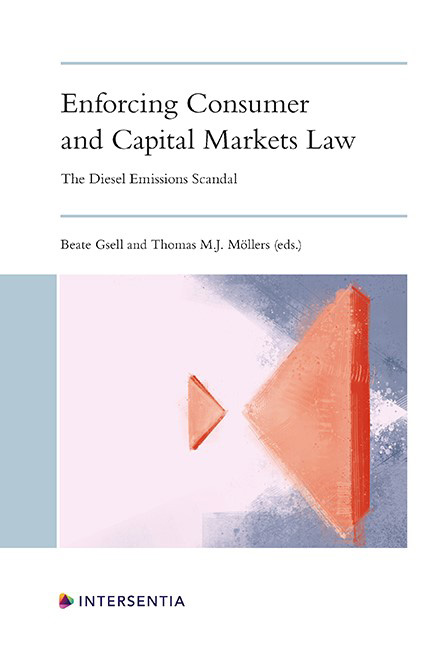Book contents
- Frontmatter
- Acknowledgement
- Contents
- List of Cases
- List of Abbreviations
- List of Contributors
- PART I INTRODUCTION
- PART II EUROPE
- PART II BEYOND EUROPE
- PART III THE SUPRANATIONAL PERSPECTIVE
- PART IV LEGAL PRACTICE PERSPECTIVE
- PART V INTRADISCIPLINARY ANALYSIS AND REFORM RECOMMENDATIONS
- Key Source Bibliography
- Index
- About the Editors
Enforcing Consumer Law in Europe and Beyond: Similarities and Differences
Published online by Cambridge University Press: 22 December 2020
- Frontmatter
- Acknowledgement
- Contents
- List of Cases
- List of Abbreviations
- List of Contributors
- PART I INTRODUCTION
- PART II EUROPE
- PART II BEYOND EUROPE
- PART III THE SUPRANATIONAL PERSPECTIVE
- PART IV LEGAL PRACTICE PERSPECTIVE
- PART V INTRADISCIPLINARY ANALYSIS AND REFORM RECOMMENDATIONS
- Key Source Bibliography
- Index
- About the Editors
Summary
INTRODUCTION
The diesel emissions scandal presents many facets, even if one looks at it only from the perspective of consumer law and its enforcement. Obviously, the perspective of consumers, particularly those who purchased the manipulated cars, is not the only relevant one. There is a complex relationship between the interests of car buyers on the one hand and the interests of public health and the environment on the other. Measures taken by environmental law authorities are not necessarily beneficial for car buyers; and while some car buyers may be outraged that their car is not as environmentally friendly as they thought it would be, others may be more concerned about resale chances or about potential driving bans. The perspective of a sufferer from asthma or an eco-activist might be completely different again.
As regards false representations about car emissions, such behaviour can potentially be addressed from different angles. Besides consumer law and unfair competition law, rules of environmental law that were not designed for the purpose of consumer protection can also come into play. As regards public law sanctions, this chapter will mainly deal with those specifically addressed at behaviour to the detriment of consumers. Thus, it will concentrate on public law sanctions that are meant to sit alongside private law remedies and to reinforce the deterrent effect of such remedies.
There is a significant degree of legal uncertainty and controversy as to whether and in which circumstances a product is defective if it does not meet certain environmental standards. Environmental law largely is not aimed at the protection of individual consumers but at the protection of the environment in general. If the use of a product for the purpose it was intended for is prohibited because it does not meet environmental standards, nobody will doubt that there is a pecuniary damage to the consumer. Even then one might still argue about whether and to what extent the manufacturer or the seller is responsible for the product's compliance with (perhaps future) regulatory standards. In the emissions scandal, it has been frequently argued by manufacturers or sellers that the cars are indeed perfectly fit for service and that no damage was done to the consumers at all, at least as long as they remain free to drive those cars. Reselling value is yet another issue .
- Type
- Chapter
- Information
- Enforcing Consumer and Capital Markets LawThe Diesel Emissions Scandal, pp. 365 - 404Publisher: IntersentiaPrint publication year: 2020

